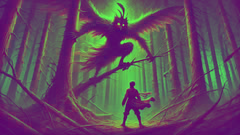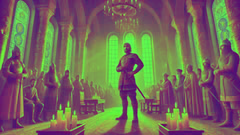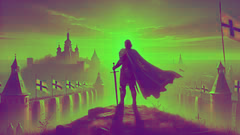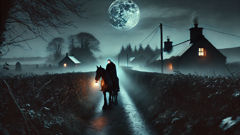Introduction
On the rolling emerald plains of ancient Rus', where silver birches sway and wolves slip through shadowy woods, tales are carried on the wind like drifting snow. Among these, none is told with greater pride or reverence than the story of Ilya Muromets, the mightiest bogatyr to ever ride beneath the twin banners of courage and loyalty. His legend begins not with triumph, but with suffering—a child bound to his bed by mysterious illness, unable to walk, while the world beyond his window unfolded in all its wild, dangerous splendor. The village of Karacharovo near Murom knew him only as Ilya, son of a humble farmer, who listened with burning longing to the stories of wandering minstrels and warriors, wishing only to run free. Yet even as his body failed him, a fire smoldered in his heart—a silent promise that one day he too would stride through the world, sword in hand, to shape the fate of Rus'.
The world beyond Ilya’s door was a tapestry of restless tribes, endless steppes, deep forests, and mighty rivers. It was an age of heroes and monsters, where darkness often threatened to swallow hope. The mighty city of Kiev, ruled by wise Prince Vladimir, stood as the last bastion against invaders and chaos. In this land, bogatyrs—knights of extraordinary prowess—were all that stood between civilization and destruction. Yet while others tested their strength and skill, Ilya could only dream, his body a prison, his soul aflame with yearning.
But fate, as the old women in Murom would say, spins its thread in secret. And one day, as the sun painted the fields gold and the distant bells of Kiev rang out on the wind, Ilya’s life changed forever. Three mysterious pilgrims—strange, ageless men robed in dust and wisdom—appeared at his door. They spoke gentle words and called for water, then, with hands that glowed with an otherworldly light, they touched Ilya's limbs. Miraculously, the strength that had been denied to him since birth surged into his body. Ilya rose, first trembling, then steady, feeling power in his arms and legs as though the world itself now coursed through him.
A new chapter unfurled before him, vibrant and terrifying. No longer an invalid, Ilya found himself called by destiny to defend the land he loved. His journey would lead him through enchanted forests, over sweeping rivers, into the halls of mighty princes, and face-to-face with demons, monsters, and the armies of invading khans. Each step would forge him anew, testing not just his strength, but his compassion, his humility, and the very core of his being. The legend of Ilya Muromets is not merely the tale of a warrior, but of a soul who rose above suffering to become the living spirit of a nation—a hero forged in the crucible of hardship, wielding not only a sword, but a boundless heart.
From Paralysis to Power: The Awakening of a Bogatyr
As the golden light faded and the last of the pilgrims’ prayers echoed in the humble hut, Ilya Muromets stood tall for the first time in over thirty years. His mother gasped, tears streaming down her cheeks, while his father sank to his knees in gratitude. Ilya felt every muscle thrum with new life—a vigor so intense it was as though he’d been forged anew by the hands of fate itself. The wooden floor, the smoke curling from the stove, even the blue haze of dawn outside the window seemed sharper, more alive. The world, once so distant, had rushed to greet him.

News of his miraculous recovery swept through Karacharovo like wildfire. Villagers who had pitied Ilya now stared in awe as he strode across the fields, his presence almost otherworldly. Yet he wasted no time basking in their wonder. Ilya was driven by a restless purpose; he knew, deep within, that his new strength was no ordinary gift. The words of the pilgrims echoed in his mind: “Rise and use your might for good. Defend your people and keep the land safe from evil.”
Before long, word reached Ilya of a terrible threat. To the west, a monstrous figure known as Nightingale the Robber had taken root in the dense Bryansk forests. With a whistle that could fell mighty oaks and shatter stone, the Nightingale preyed on travelers along the road to Kiev, leaving nothing but desolation in his wake. Merchants and peasants alike dared not pass, and the city of Kiev itself trembled at the bandit’s approach.
Driven by a sense of duty, Ilya fashioned a great spear from a young birch and set out on foot toward the haunted wood. As he traveled, the wilds of Russia seemed to recognize him. Wolves watched from the brush but did not attack. The wind rustled approvingly through the treetops. At night, he listened to the crackling fire, recalling the tales he’d once only imagined—the stories of heroes who forged their destinies through trial and sacrifice.
The journey to Bryansk was fraught with danger. On the banks of the Oka River, Ilya faced his first true test. A gang of outlaws blocked his path, demanding gold and mocking his solitary approach. But Ilya, fueled by a lifetime’s worth of pent-up yearning, did not hesitate. With the force of a tempest, he drove the robbers into retreat, his new strength making him unstoppable. Word of this deed traveled quickly, and whispers began to spread—perhaps a new bogatyr had arisen in the land.
Finally, Ilya reached the shadowy forest where Nightingale the Robber lurked. The air here was thick with menace; even the birds had fallen silent. As Ilya ventured deeper, an eerie whistling began to swirl through the branches. Trees shook, and the very earth seemed to tremble. Then, with a sound like thunder, Nightingale himself appeared—half-man, half-beast, his eyes glowing with malice, perched on a twisted limb. With a mighty breath, the robber unleashed his infamous whistle.
But Ilya stood firm. The gale battered him, sending branches and stones flying, yet he did not yield. Planting his feet, he hurled his spear with unerring aim. The Nightingale toppled from his perch, stunned but alive. With iron resolve, Ilya bound the monster and dragged him from the forest, determined to deliver him to Prince Vladimir in Kiev. The road that had once been choked with fear now echoed with hope, as news spread that the terror of Bryansk had been defeated by a new champion.
It was on this journey that Ilya’s legend truly began to take root—not just as a man of strength, but as one who would risk everything for the safety of others. Each village he passed through rejoiced in his victory, offering bread, salt, and blessings. In their eyes, he saw a reflection of his own longing: hope that the land could be protected from the darkness at its borders. As he walked beneath the wide sky, dragging the bound robber behind him, Ilya Muromets felt the first true stirrings of destiny. He was no longer a prisoner of his body or fate—he was a hero called to serve all of Rus'.
Defender of Kiev: The Trials of Loyalty and Strength
The city of Kiev rose before Ilya Muromets like a vision from legend: domes of gold gleaming in the sunlight, banners fluttering above stone ramparts, and the river Dnieper winding past its walls like a silver serpent. When he arrived at the city gates, dragging the battered form of Nightingale the Robber behind him, the guards stared in disbelief. Word quickly reached Prince Vladimir, who summoned the newcomer to his hall.

Inside the princely court, Ilya stood among nobles, warriors, and courtiers—all watching this broad-shouldered stranger with curiosity and suspicion. Prince Vladimir, wise and keen-eyed, questioned Ilya about his origins and his quest. When Ilya told his story, the prince was moved but skeptical. To prove his might, Vladimir set him three impossible tasks: defeat the strongest warriors of Kiev in single combat; fell an ancient oak that had resisted axe and fire for generations; and demonstrate his loyalty to the land and its people.
Ilya met each challenge with a quiet, relentless determination. In the arena, he faced Kiev’s greatest champions—hulking men clad in shining mail and bristling with weapons. One by one, they fell before his might. The ancient oak, whose roots had entwined with legend itself, crashed to earth after only a few blows from Ilya’s axe. The prince watched in awe as this newcomer accomplished feats that had long eluded even the most seasoned knights.
But the true test came not in battle, but in compassion. When a poor widow appeared before Vladimir, begging for justice against a corrupt noble who had stolen her land, the prince hesitated—such matters were often swept aside in courts dominated by power. But Ilya stepped forward, speaking on her behalf and demanding fairness. His words echoed through the hall: “What is strength if not used to protect those who cannot defend themselves?”
Impressed by his valor and compassion, Prince Vladimir welcomed Ilya among the bogatyrs of Kiev. He was given a place of honor at the round table and entrusted with the defense of the city. The people of Kiev soon grew to love their new champion. Children ran after his horse, old women blessed him in the streets, and men whispered stories of his deeds by firelight.
Yet peace in Kiev was always fragile. Rumors spread of Tatar hordes gathering on the steppe, preparing to sweep across Rus' like a storm. In the night, Ilya would stand watch atop the ramparts, gazing at the stars and feeling the weight of destiny pressing upon him. He knew his strength was a gift—and a burden. Each day brought new trials: bandits along the river, beasts lurking in the woods, and disputes among the city’s lords.
Through it all, Ilya remained steadfast. He forged friendships with other bogatyrs—Alyosha Popovich, the clever and quick-witted trickster; Dobrynya Nikitich, famed for his skill with the sword; and others who would become legends in their own right. Together, they defended Kiev against every threat, their names spreading across the land like banners in the wind.
But the greatest test still awaited Ilya Muromets: a trial not just of strength, but of spirit. For beyond the distant steppe, a darkness was gathering that threatened to engulf not just Kiev, but all of Rus'. Ilya would need every ounce of courage and wisdom if he was to face what was coming—a challenge that would demand not just the heart of a warrior, but of a true protector.
The Battle for Rus': Ilya’s Stand Against Invaders
Across the endless steppe, word spread of Ilya Muromets—his strength, his courage, and his growing legend. It was only a matter of time before these stories reached the ears of enemies hungry for conquest. In the east, the Tatar khans—ruthless warlords mounted on swift horses—gathered their armies, plotting to overrun the heart of Rus'. With smoke-darkened banners and the thunder of hooves, their legions swept across the land, burning villages and scattering terrified peasants before them.

Kiev braced itself for siege. Prince Vladimir summoned his bogatyrs and every able-bodied man to the city’s defense. The air was thick with dread as refugees flooded through the gates, their faces etched with fear. But at the city’s heart stood Ilya Muromets, unflinching and resolute.
As the Tatars drew near, Ilya took up his armor—crafted by the finest smiths and gleaming like the dawn—and mounted his horse, Cloudfall. At his side rode Dobrynya Nikitich and Alyosha Popovich, each ready to lay down their lives for Kiev. On the eve of battle, Ilya knelt before the cathedral’s golden icons, praying not for victory, but for the strength to protect the innocent.
When dawn broke, the horizon boiled with enemy banners. The Tatars advanced, hurling taunts and arrows. The city walls shook under their assault, and fire licked at the wooden gates. But Ilya stood atop the ramparts, his eyes blazing. As the first wave surged forward, he leapt down onto the field, swinging his mighty sword with a force that sent armored foes flying. His horse reared and charged into the fray, scattering enemy ranks like autumn leaves.
The battle raged for hours. Arrows darkened the sky; shouts and cries mingled with the clash of steel. Again and again, Ilya broke through enemy lines, rallying his comrades and inspiring hope in the hearts of the defenders. When a Tatar champion—taller than any man, clad in black iron—challenged him to single combat, Ilya accepted without hesitation. The two warriors met amid a ring of blood and broken shields. Their blows shook the earth. But Ilya’s strength, sharpened by hardship and tempered by compassion, proved greater. With a final strike, he sent the champion sprawling.
As dusk fell, the Tatars retreated in chaos, their banners trampled and their pride shattered. The people of Kiev poured from the gates to embrace their defenders. Prince Vladimir wept with relief, declaring Ilya Muromets the savior of Rus'. Yet as the city celebrated, Ilya found no peace. He walked among the wounded and grieving, comforting them and mourning those lost. For all his victories, he knew that each battle left scars on the land and its people.
In the months that followed, Ilya became a living legend. Bards sang of his deeds from Novgorod to the Black Sea; parents named their sons after him in hope that they too might be brave and strong. But Ilya himself remained humble. He spent long hours in prayer and contemplation, ever aware that his power was both a gift and a test.
Though peace returned to Kiev for a time, Ilya never laid down his sword. He rode out against threats both mortal and magical—dragons lurking in northern swamps, spirits haunting moonlit ruins, and traitors plotting within city walls. Each adventure became another thread in the tapestry of his legend, woven through with courage, loyalty, and a steadfast love for his homeland.
Conclusion
Long after the battles faded and the fires of war were quenched, the name of Ilya Muromets continued to echo across Russia’s vast landscapes. He became more than just a warrior—he was the living embodiment of courage and resilience, a protector whose strength was matched only by his compassion for the weak. Villagers still speak of how he traveled the roads in secret, righting wrongs and defending those who had no champion. In monasteries and palaces alike, his story was told not as mere history, but as a guiding light for generations to come. The legend of Ilya Muromets reminds us that true heroism springs not from force alone, but from a heart that refuses to yield to despair. In times of darkness or danger, when hope seems lost, it is said that if you listen carefully to the wind over the steppe or the hush beneath ancient pines, you might still hear the gallop of Cloudfall and the unwavering oath of Russia’s greatest bogatyr—a promise that no matter how deep the night, courage will always rise anew.













